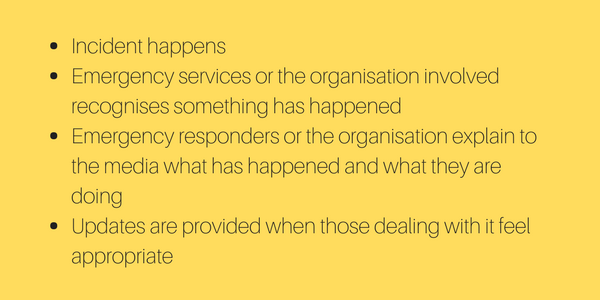Crisis communication – are you in the war room?
When a crisis strikes do you have the right plans and processes in place? Are you able to respond quickly and decisively? Above all do you have the right mental approach to facing a modern day crisis?
For many years the management of a crisis has been unchanged and fairly straightforward. It went along the lines:

Since 2010 this has no longer been the case. Modern life has brought the challenges of social media, citizen journalists and people with a sceptical approach to experts. It means communicators have to approach crisis comms in a different way, with a broader understanding and a seat within the crisis ‘war room’.
I have worked in police communication for almost 20 years and have dealt with many crises both operational and reputational. There are many lessons that can be learnt from the police approach to managing the most critical times in our lives. It starts with having a framework and plans that are regularly tested and it has communication at the heart of it. This is communication to the world but also within the organisation.
Control has been at the heart of previous attempts to manage a crisis and this now has to make way for collaboration. Where those in charge had once thought they had all the information we are now in a world where everyone has part of the story. It means ensuring those in charge can see that managing a crisis is more about a narrative of listening, gathering and then speaking than an autocratic sharing of information to suit the organisation.
Crisis communication is about honest conversations, understanding what is being said and where, and having a clear narrative to cut through uncertainty. Police communicators are now focused on listening to what people are saying about events, particularly through social media. Understanding views and issues in the early stages will ensure you can make the right decisions in communicating throughout the incident.
Critical incidents may not happen very often for most businesses and organisations. It may feel as though they are a long way away and not impact on our daily work. When they arrive they are swift and decisive. They can lead to long term confidence in a brand or business or they can be the beginning of the end of it. Professional communicators have a key role in a crisis – be ready for it, prepare themselves and others for it, and be the calm voice of reason and action during the storm.
Let’s put crisis communication in the forefront of our thoughts. If you have a view or question about crisis communication get in touch now or book tickets for #PRFest on Friday 16 June to discuss modern crisis communication.
Guest post by Amanda Coleman, Greater Manchester Police
